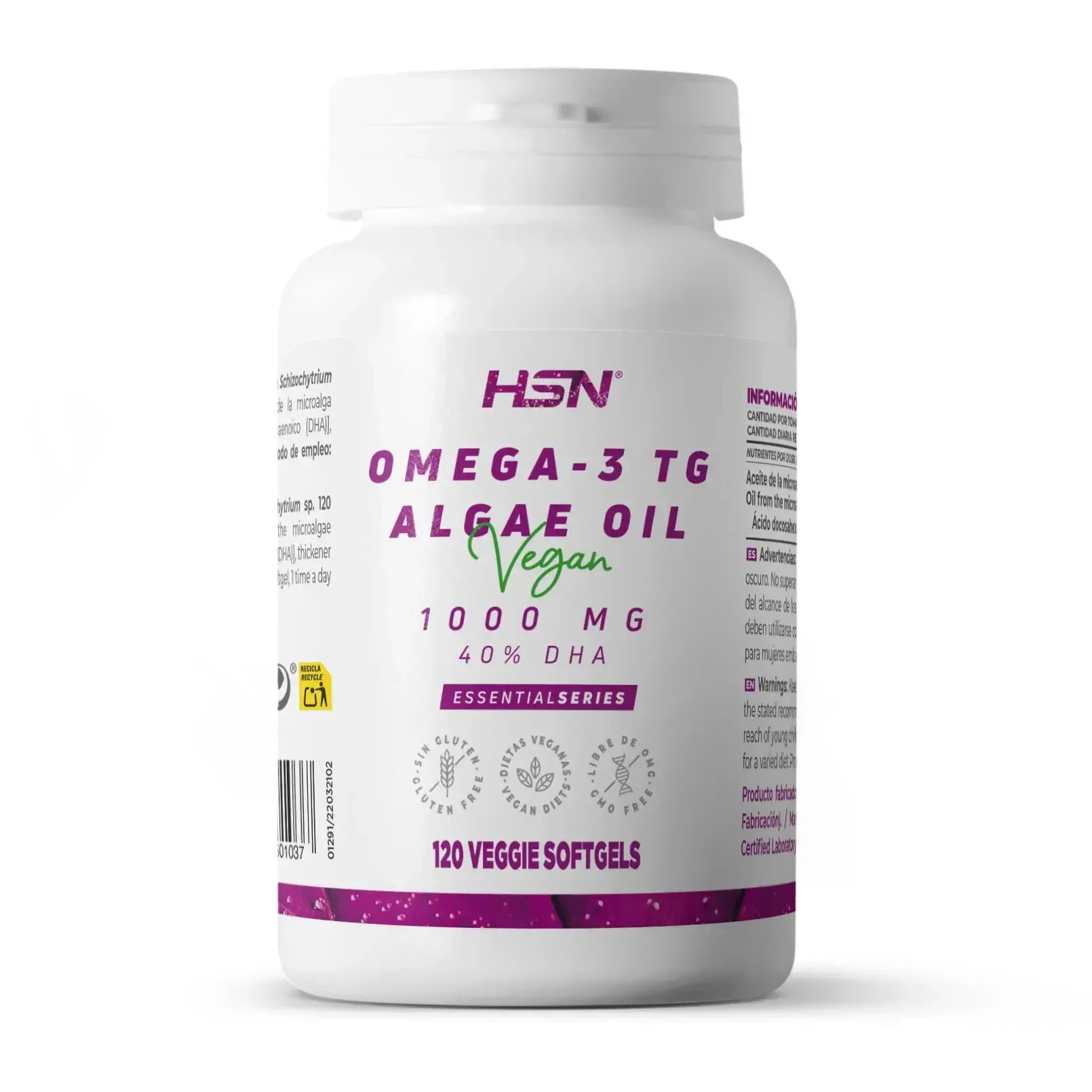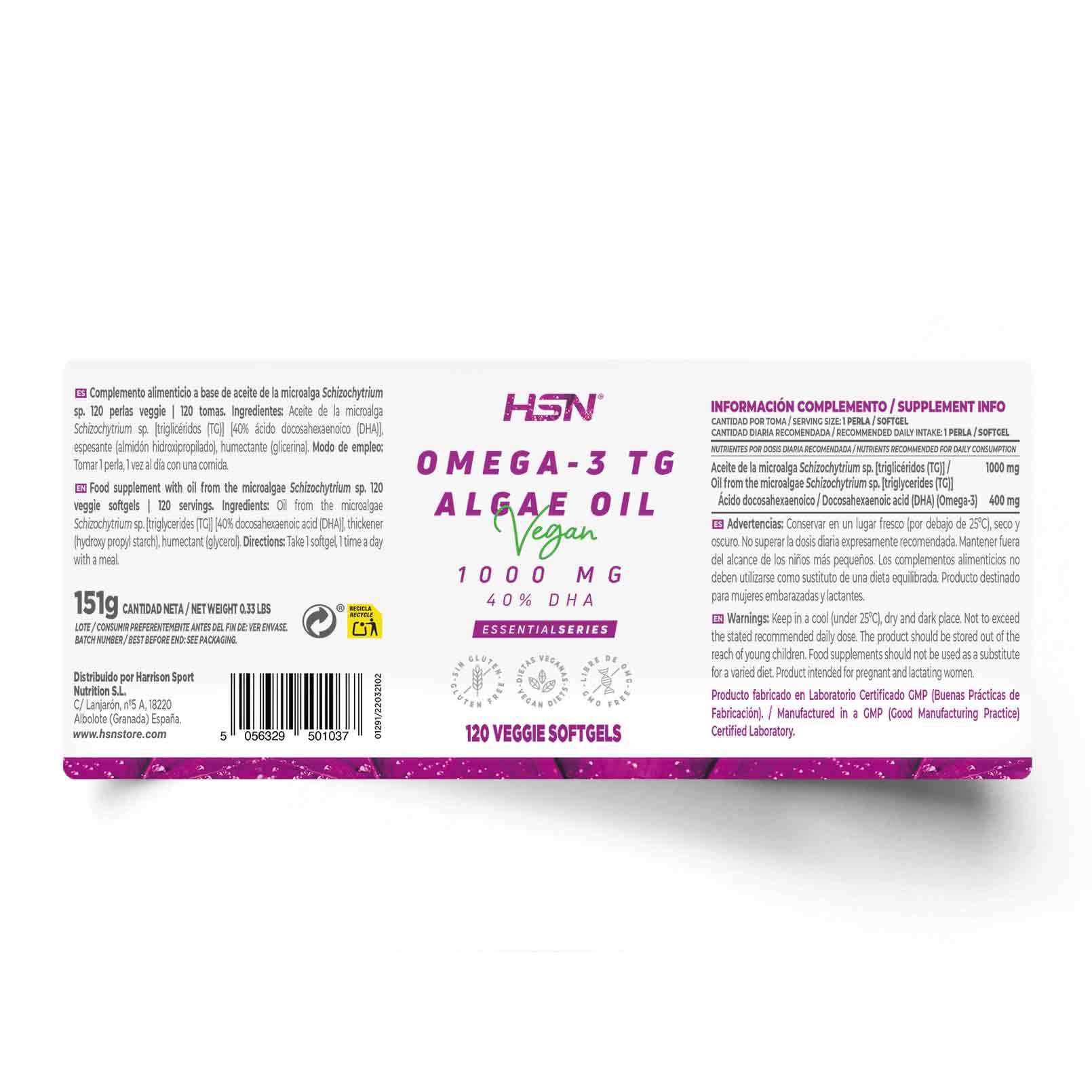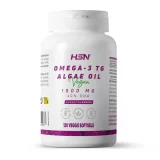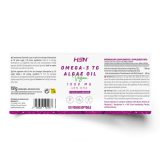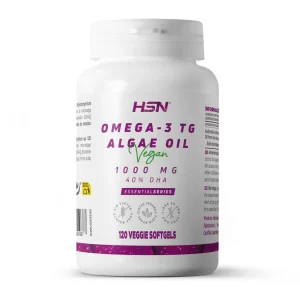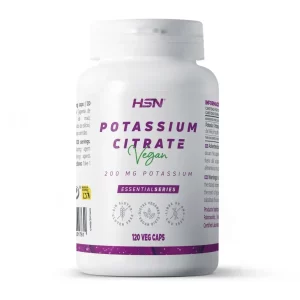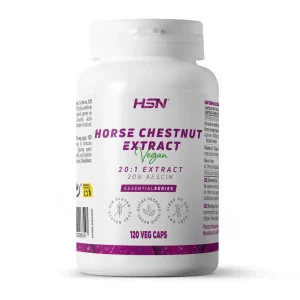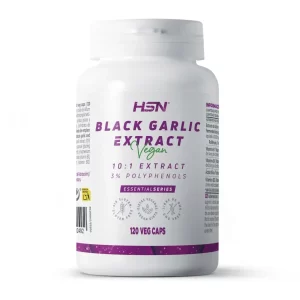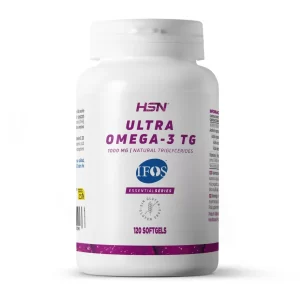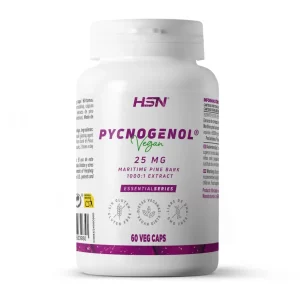- A vegan omega-3 is possible. From algae oil!
- It does not taste anything, nor does it repeat. No taste or smell of fish or sea.
- 400mg of DHA (Docosahexaenoic Acid) guaranteed per softgel.
- In the form of triglycerides. Natural and as bioavailable as possible.
- No ethyl esters. No contamination of the sea. Guaranteed integrity.
- No peroxidation. Controlled stability treatment. The best quality.
- With vegetable glazing agent. Completely suitable for vegan diets.
- A genus of algae unique to Schizochytrium species. The highest quality vegan species.
Vegan Omega-3. The highest content of DHA
Omega-3 Vegan Algae Oil 1000mg by EssentialSeries is a food supplement in vegetable softgels developed from pure natural algae oil from the Schizochytrium genus, a species certified as having the highest natural DHA content possible.
Omega-3 fatty acids are nutrients that are necessary for dietary intake, as although the body can synthesise EPA and DHA from ALA intake, this conversion has been found to be insufficient and therefore, food supplementation with these fatty acids is considered adequate in almost all Western dietary contexts.
In addition, this product has been encapsulated in vegetable softgels to provide 100% vegan omega-3, both in its source oil and in its presentation format.
How can there be a vegan omega-3? We’ll tell you about it
Originating from algae. Schizochytrium species
The omega-3 that we consume in the diet, worldwide, except for Alpha-Linolenic Acid (ALA), is of animal origin and is mainly concentrated in oily fish, which must be subjected to adequate cooking (steam, for example) so as not to peroxidise and spoil their omega-3.
The belief that there is no such thing as vegan DHA is widespread, and many people who start vegan diets are punished by the nutritional insufficiency of this essential fatty acid within months of starting to restrict their consumption of animal foods.
This does not need to be the case, as there is a genus of algae called Schizochytrium which is naturally rich in Docosahexaenoic acid.
These microalgae are grown under controlled conditions of time, temperature, pH, and exposure to air, in a liquid culture medium containing the nutrients necessary for their development. The water used for cultivation is food grade and is verified to be free of marine biotoxins and does not contain any contaminants.
The quality controls and evaluations of the microalgae cultivation, as well as the rest of the manufacturing process of the product, is controlled by the highest international quality certifications, which verify that each step of the process has been properly optimised to obtain the highest quality oil rich in DHA.
Guaranteed DHA content. The ultimate exclusive omega-3
Oils, both animal and vegetable, have varying amounts of their fatty acids depending on multiple reasons, such as the cultivation conditions, for example, of each batch of microalgae.
Given the extremely controlled cultivation conditions under which the microalgae used for the development of our vegan omega-3 are grown, the DHA content is guaranteed at 40% in all production batches of this food supplement.
And, don’t let other companies fool you!!
Our vegan omega-3 guarantees a REAL 40% DHA content, measured by mass, so each 1000mg softgel of algae oil provides 400mg of Docosahexaenoic Acid.
Other manufacturers who claim a percentage of fatty acids measure the fatty acid content in the volume of the softgels, which gives a value that is not real, and is lower than indicated, so that the real percentage indicated is between 5 and 15% lower. Don’t pay for what you don’t consume!
At HSN we guarantee that the content indicated is what you receive.
We are completely transparent in our procedures and information provided.
With vegetable glazing agent. Gelatine-free
Softgels are usually made with glazing agents made from gelatines because they are cheap and effective, but gelatines have a problem: they are of animal origin.
How are we going to make vegan Omega-3-rich oil softgels with gelatine softgels?
There are very unknown glazing agents derived from starch, such as the one we use in our product.
These softgels are not widely used in industry as, in addition to being more expensive to produce, handling procedures dictate that they need to be handled delicately to keep them in good condition until the end of manufacture, and unfortunately many laboratories do not know how to do this.
At HSN we follow a chain of custody for vegan softgels, where we control all relevant factors of the environmental exposure of this product, so the vegan softgels keep all the original holding power intact, allowing for the best containment of the algae oil, and assured quality.
It provides a high concentration that is excellent for vegan diets without animal consumption
The 400mg of DHA per softgel is significant. It provides a high daily dose of omega-3, which is excellent especially for vegan diets, as their consumption of omega-3 is extremely low, and of DHA is non-existent.
Not only that, people who have a reduced consumption of oily fish, due to a lack of personal taste for this type of food, or due to allergies, can benefit enormously from supplementing their diet with this product, as it is vegetable, and also provides what they do not consume through their usual diet.
We do not use colourings or opacifiers. Transparent softgels, just like us!
Many manufacturers add large quantities of additives to their products, something that in our opinion is unnecessary, because… What’s the point?
We don’t need to hide anything, our algae oil is of the highest purity, clean, and free of contaminants, it is transparent-yellowish with an oily appearance, and that is just as it should be.
We do not use colourings in its composition, nothing that makes it impossible to properly appreciate the content of the softgels, because you, as a consumer, have the right to know everything you are taking. And at HSN we want you to have peace of mind knowing that you are only using the best.
Comfortable to take, easy-to-swallow soft coating and high concentration
Softgels can sometimes be difficult to take, but not here.
Although not small in size, you only need to use one softgel a day, so it’s easy.
What’s more, thanks to the softgel’s smooth exterior, it’s easy to take. You just need to use a little water to swallow the softgel, and you have a considerable supply of DHA in your daily diet.
Content guaranteed to be of the highest purity, with verified integrity and absence of contaminants
The omega-3 fatty acids in HSN algae oil are in the form of natural triglycerides, are much better absorbed than ethyl esters, and are… Natural, they are not chemically altered, which makes them better.
All the algae oil we produce is analysed and the result is verified to be optimal; thanks to the exhaustive quality control we follow, the products we develop are of the highest quality, thus guaranteeing the supply of clean algae oil, without oxidation of its fatty acids, thus providing clean and undegraded omega-3. With a total absence of pollutants from the sea.
Enjoy the highest purity vegan omega-3s available in HSN’s vegan omega-3 supplement.
Omega-3s are essential nutrients packed with properties. Don’t miss out on them
The omega-3s that we can consume in our daily diet include ALA, EPA, and DHA.
In that order, Alpha-Linolenic Acid is converted to EPA, Eicosapentaenoic Acid, and this in turn is converted to DHA, Docosahexaenoic Acid, the end result of the conversion considered to be the ‘most important Omega-3’.
- Docosahexaenoic acid helps maintain normal brain function.
- Docosahexaenoic acid contributes to the maintenance of normal vision.
For these reasons, and because it is the end result of a long chain of conversion, which is difficult from the consumption of ALA, DHA is considered to be a fatty acid whose direct food supplementation is very positive for the Western population, which is not characterised by a high daily consumption of oily fish.
Ideal for pregnant women. Find out why
Omega-3s are excellent nutrients for pregnant women, as DHA is a fatty acid that when consumed in amounts of at least 250mg per day by pregnant or breastfeeding women, contributes to normal eye development in the foetus and breastfed infant.
In many cases, fish and its derivatives are foods that are not allowed during pregnancy, so the consumption of this fatty acid can be difficult.
Enjoy a high intake, covering your daily DHA needs, with HSN’s vegan omega-3 food supplement, with no fish or shellfish, only seaweed from controlled cultivation that is completely safe for pregnant or breastfeeding women.
Other suitable use profiles. Who is it recommended for?
Not only pregnant women can use this supplement. It is ideal for:
- People looking for the positive effects of DHA on eyesight and brain. Therefore, it is widely used by students and office workers.
- Vegans whose intake of omega-3 fatty acids is the usual intake in these diets, which is insufficient.
- People following diets with sub-optimal intake of omega-3 fatty acids due to insufficient consumption of oily fish in their diet.
Anyone making the transition to veganism should include a plant-based omega-3 food supplement in their daily diet.
What other vegan supplements can be combined with? The recommendations of nutrition specialists recommend:
Vegan Omega-3 can be combined with all types of food supplements, there is no known restriction on its use with any other product.
Some of the ideal recommendations are important nutrients for pregnancy and vegetarianism such as folic acid or vitamin B12, both of which you can find in the product Methyl B9+B12 in active presentations of the highest quality and bioavailability.
In other cases there are recommendations such as:
- For athletes who use omega-3 after training, Evorecovery is an excellent preparation to improve recovery.
- For people who are not in control of their diet and are not aware of the deficiencies they may have: Evovits Plus+.
- For people looking for the positive effects on vision of Omega-3: natural Lutein + Zeaxanthin .
Bibliographical references
- Astiasarán, I., & Ansorena, D. (2009). Algal Oils. In R. A. Moreau & A. B. T.-G. and H.-P. S. O. Kamal-Eldin (Eds.), Gourmet and Health-Promoting Specialty Oils (pp. 491–513).
- Gil, A. (2010). Tratado de Nutrición. Nutrición Humana en el Estado de Salud. (Coord. Martínez, E & Maldonado, J.). Madrid:Editorial Médica Panamericana.
- Sarris, J., Mischoulon, D., & Schweitzer, I. (2012). Omega-3 for bipolar disorder: Meta-analyses of use in mania and bipolar depression. Journal of Clinical Psychiatry, 73(1), 81–86.
- Stella, A. B., Cappellari, G. G., Barazzoni, R., & Zanetti, M. (2018). Update on the impact of omega 3 fatty acids on inflammation, insulin resistance and sarcopenia: A review. International Journal of Molecular Sciences, 19(1).
- Taha, E., Abouelhawa, S., El-Geddawy, M., Sorour, M., Aladedunye, F., & Matthäus, B. (2014). Stabilization of refined rapeseed oil during deep-fat frying by selected herbs. European Journal of Lipid Science and Technology, 116(6), 771–779.
- Wei, M. Y., & Jacobson, T. A. (2011). Effects of eicosapentaenoic acid versus docosahexaenoic acid on serum lipids: A systematic review and meta-analysis. Current Atherosclerosis Reports, 13(6), 474–483.
The beneficial effect is obtained with a daily intake of 250mg docosahexaeonic acid.

